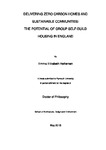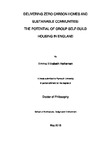Delivering zero carbon homes and sustainable communities: the potential of group self-build housing in England
| dc.contributor.supervisor | de Wilde, Pieter | |
| dc.contributor.author | Heffernan, Emma Elizabeth | |
| dc.contributor.other | School of Art, Design and Architecture | en_US |
| dc.date.accessioned | 2015-07-15T15:22:45Z | |
| dc.date.available | 2015-07-15T15:22:45Z | |
| dc.date.issued | 2015 | |
| dc.identifier | 10371937 | en_US |
| dc.identifier.uri | http://hdl.handle.net/10026.1/3429 | |
| dc.description | Full version unavailable due to 3rd party copyright restrictions | |
| dc.description.abstract |
Concerns about anthropogenic climate change, fossil fuel depletion, energy security, and damage to our ecosystems are acting as a catalyst for action in many sectors of industry and society. One key sector which has been identified as crucial for addressing these issues is the building sector. Therefore, in the UK context, with the aim of reducing carbon dioxide emissions, the requirements for new homes in terms of their energy efficiency are becoming ever more stringent, leading to the introduction of the zero carbon homes standard from 2016. Alongside this, broader priorities for sustainable development have been established in the UK, with a focus on the creation of sustainable communities. These are communities which support the diverse needs of residents and provide a good quality of life whilst protecting the natural environment. The literature suggests that the volume housebuilding sector is failing to meet housing demand in terms of either quantity or quality. Furthermore, it is apparent that the sector is failing to respond to voluntary stimuli for the delivery of zero carbon homes. Thus, it is with an overall aim of supporting the delivery of zero carbon homes and sustainable communities that this thesis has been undertaken. The UK Government suggested in 2011 that self-build homes, in which the occupant is involved in either building or commissioning the home, are more likely to be affordable, energy efficient and innovative than open market housing. Self-build housing accounts for only around 10% of new homes built in the UK, and group self-build is a small proportion of this. The UK Government has an aspiration to double the size of the self-build sector, with an expansion in the group self-build sector, over the decade to 2021. Literature on the self-build sector is limited, and that on the group self-build sector even more so. Indeed, gaps in knowledge in terms of the motivations for and benefits of group self-build exist. There are also gaps in knowledge in terms of the barriers to group self-building and ways in which the expansion of the sector could be best supported. Furthermore, existing literature on drivers for and barriers to zero carbon homebuilding is limited and fails to gather opinions from the broad range of professionals involved in the delivery of new homes. With the aim of addressing these gaps in knowledge, three complementary studies were conducted with an element of focus on the region of Cornwall, in South West England. With the aim of exploring opinions of professionals involved in the delivery of new homes regarding zero carbon homebuilding, a series of 34 semi-structured interviews was undertaken within the first study (Perceptions of zero carbon homebuilding). The second study was undertaken with the aim of investigating professional and expert opinions on the suitability of group self-build as a development model for zero carbon homes and sustainable communities (Self-build perceptions). This investigation employed the Policy Delphi method, an iterative, non-contact group research process in which data was gathered from participants through three rounds of online questionnaire surveys. This second study was formed of two concurrent studies; one employed a panel of national participants within England, the other a panel of regional participants within South West England. The third and final study aimed to explore the experience-based opinions of group self-builders through a series of 11 in-depth interviews (Group self-build reflections). The three studies are presented independently. However, each subsequent study is built upon the knowledge gained in the previous study. Within the final chapter of the thesis, the results are brought together and triangulated through a consideration of how the findings coalesce to cast light on the three central concepts of zero carbon homes, sustainable communities, and group self-build housing. The findings from this research identify and elucidate a number of themes of drivers for and barriers to zero carbon homebuilding. Themes of drivers include: legislative, economic, social responsibility, individual, and industry. Themes of barriers include: economic, skills and knowledge, industry, legislative, and cultural. Multiple potential support mechanisms for the delivery of zero carbon homes were also identified. The findings highlight the need for a cultural shift in the housebuilding industry, reducing the over-reliance on volume housebuilders. A broad range of benefits and motivations for group self-building have been identified and explored. However, whilst a strong appetite for environmentally sustainable development amongst group self-builders is established, this research casts some doubt on the central assertion that group self-build homes will be more energy efficient than speculatively built homes. Differences between the individual and group self-build sector were exposed both in terms of the motivations and the barriers faced. This thesis demonstrates how the benefits of group self-build housing serve to help create sustainable communities, and how they also serve to address some of the barriers to zero carbon homebuilding. The findings of this research demonstrate that group self-build housing offers a significant number of potential benefits towards the delivery of zero carbon homes and the creation of sustainable communities. | en_US |
| dc.description.sponsorship | European Social Fund through the Combined Universities in Cornwall | en_US |
| dc.language.iso | en | en_US |
| dc.publisher | Plymouth University | en_US |
| dc.subject | Zero carbon homes | en_US |
| dc.subject | Self-build housing | |
| dc.subject | Group self-build | |
| dc.subject | Sustainable communities | |
| dc.subject | Drivers | |
| dc.subject | Barriers | |
| dc.subject | Support mechanisms | |
| dc.subject | Policy support | |
| dc.subject | Role of housebuilders | |
| dc.subject | Perceptions | |
| dc.subject | Affordability | |
| dc.subject | Energy efficiency | |
| dc.subject | Policy Delphi | |
| dc.subject | Cornwall | |
| dc.title | Delivering zero carbon homes and sustainable communities: the potential of group self-build housing in England | en_US |
| dc.type | Thesis | |
| plymouth.version | Edited version | en_US |
| dc.identifier.doi | http://dx.doi.org/10.24382/4686 | |
| dc.identifier.doi | http://dx.doi.org/10.24382/4686 |
Files in this item
This item appears in the following Collection(s)
-
01 Research Theses Main Collection
Research Theses Main



